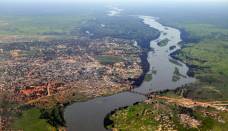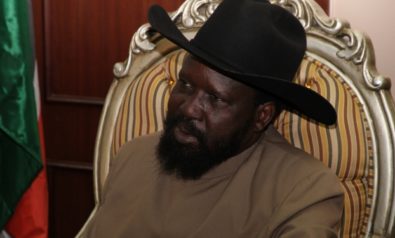
South Sudan is the youngest state on the African continent. It became independent with the referendum that was held from 9 to 15 January 2011, which split the former nation state of Sudan into two separate entities: South Sudan and Sudan. Before that, the country had a history of violence and constant conflict, between the mainly Muslim North and the South, which is influenced by indigenous culture as well as Christianity.
Sudan as a whole became independent from British and Egyptian rule in 1956. But the country was way too divided along ethnical and religious lines to form a functioning nation state. The South’s underlying fear of being dominated by the North, eventually led to the First Sudanese Civil War that could only be ended in 1972, by letting the South form the Southern Sudan Autonomous Region. But peace did not last long. When President Gaafar Nimeiry revoked the Southern autonomy in 1983, another civil war started, that could again only be put to an end when autonomy was restored in 2005. The referendum that was a part of the Comprehensive Peace Agreement of 2005 was supposed to finally end the decades of warfare and civil unrest, which killed 1.5 million people and displaced another 4 million. A massive majority of 99% voted for independence, which led to the secession and final independence of South Sudan on 9 July 2011. But even though the referendum and its outcomes were internationally backed and welcomed, it was obvious from the start that the new born country still had a long way to go.
Among the many unresolved questions and issues the country will have to deal with in the future is,most importantly,its relationship with the northern part of Sudan. Problems here are mainly about the unresolved oil issue. Since South Sudan’s secession there are ongoing conflicts about how to share the oil revenues. Even though the majority of the oil production is based in South Sudan, it still needs to be exported through Sudan’s territory. Oil is the most important resource forthe area and supposed to determine both countries’ economical fate, therefore a solution which will satisfy both countries will not be easy to find. Another major issue is the border between the two new countries which had not been fully determined at the time the South became independent. The areas of Abyei and the Nuba mountains in particular are highly disputed. Additionally there are also several problems within the new country itself. Lack of infrastructure, the disastrous humanitarian situation and ongoing tribal and ethnic conflict within the country will continue to be a challenge. Time will show if South Sudan will eventually be able to leave its war-torn past behind and stand on its own feet. But until then a lot of work needs to be done-not only by the country's authorities itself, but by the international community.
Facts and figures:
President: Salva Kiir Mayardit
Capital: Juba
Official language: English
Population: 8,260,490 (According to the census of 2008 – disputed)
For more than 10 years, Fair Observer has been free, fair and independent. No billionaire owns us, no advertisers control us. We are a reader-supported nonprofit. Unlike many other publications, we keep our content free for readers regardless of where they live or whether they can afford to pay. We have no paywalls and no ads.
In the post-truth era of fake news, echo chambers and filter bubbles, we publish a plurality of perspectives from around the world. Anyone can publish with us, but everyone goes through a rigorous editorial process. So, you get fact-checked, well-reasoned content instead of noise.
We publish 2,500+ voices from 90+ countries. We also conduct education and training programs on subjects ranging from digital media and journalism to writing and critical thinking. This doesn’t come cheap. Servers, editors, trainers and web developers cost money.
Please consider supporting us on a regular basis as a recurring donor or a sustaining member.
Support Fair Observer
We rely on your support for our independence, diversity and quality.
Will you support FO’s journalism?
We rely on your support for our independence, diversity and quality.





